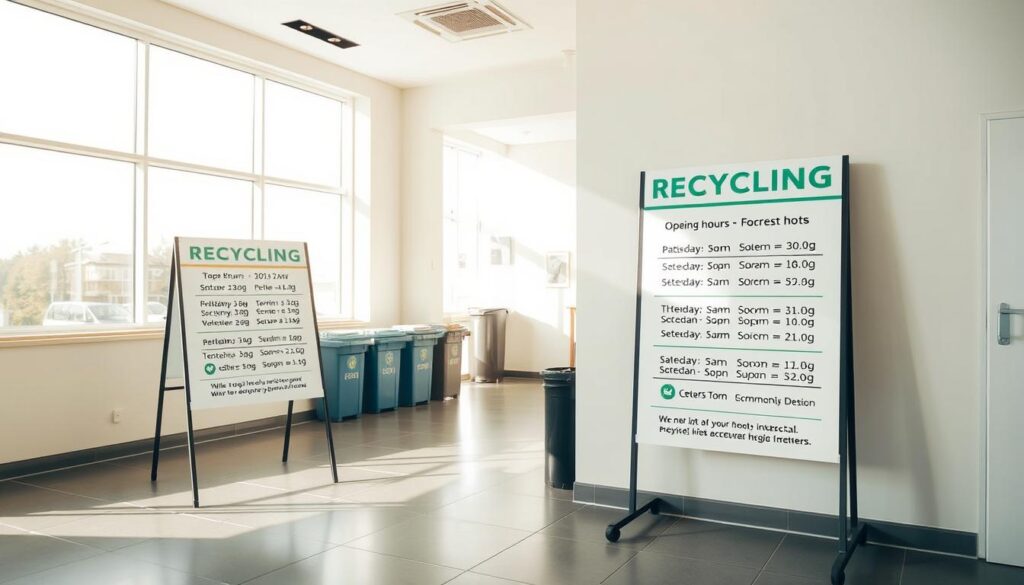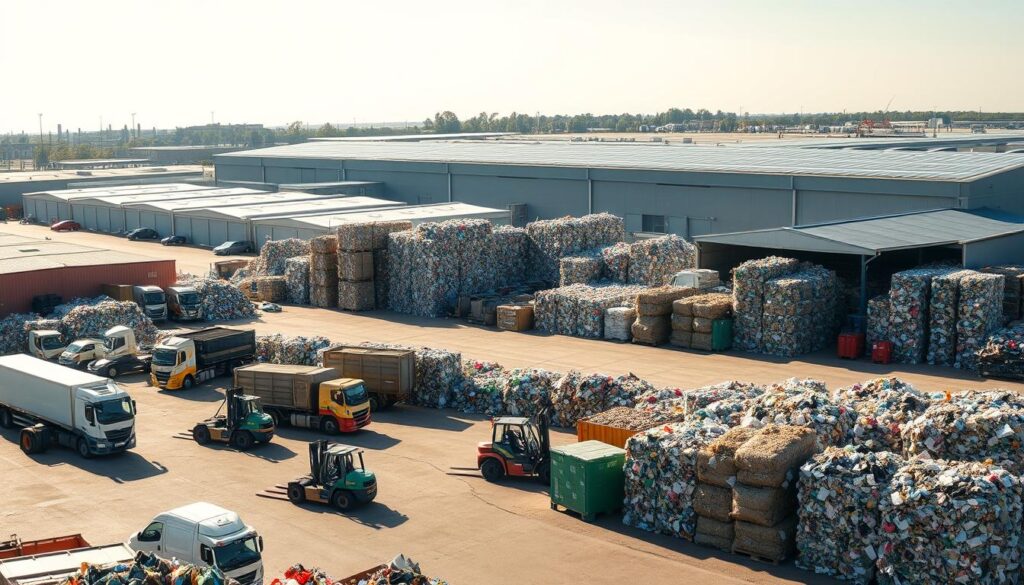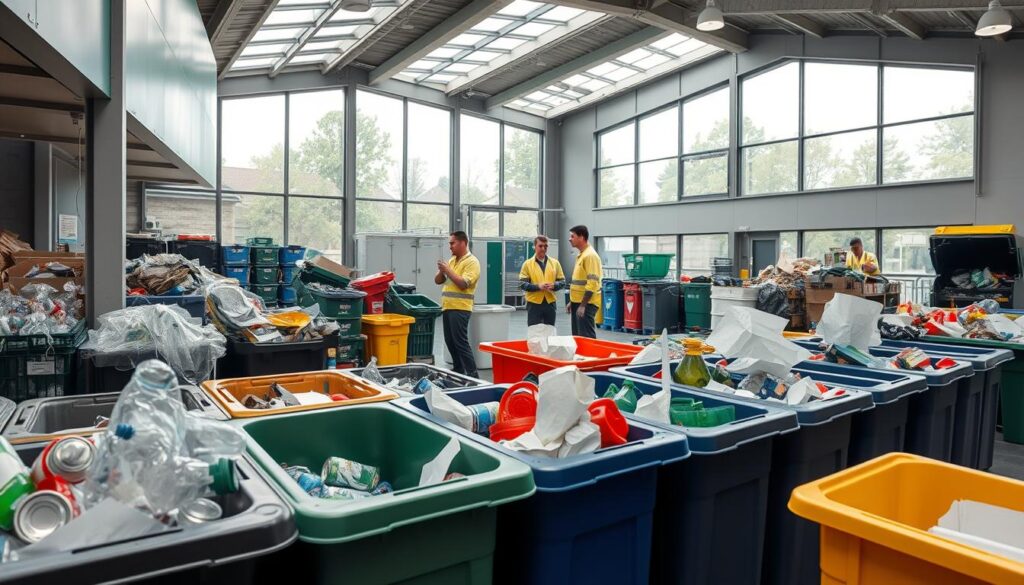As a resident of Hull, you’re likely to generate various types of waste, from garden waste and soil to bulky household items. But do you know where to take these unwanted materials? Household Waste Recycling Sites (HWRS) are designed to help you dispose of extra waste responsibly.
These sites offer a range of services, allowing you to recycle materials like rubble, furniture, and electrical items. By using these facilities, you can help keep Hull clean while ensuring that materials are recycled in an environmentally friendly manner.
Key Takeaways
- Discover the locations and opening times of Hull’s household waste recycling sites.
- Learn what materials can be disposed of at these sites, including construction and demolition waste.
- Understand the permit requirements and alternative waste disposal options.
- Find practical tips for efficient recycling in Hull.
- Get information on the services offered by recycling centres in Hull and nearby East Riding.
Understanding Household Waste Recycling Sites in Hull
Household Waste Recycling Sites (HWRS) in Hull provide a vital service for residents, enabling them to recycle and dispose of waste responsibly. These sites are specifically designed to maximise recycling efforts and ensure proper waste segregation, helping to reduce landfill usage.
What Are Household Waste Recycling Sites?
HWRS in Hull are designated facilities where residents can dispose of waste that cannot be collected through regular bin collections. The centres accept a wide range of materials, including garden waste, soil and rubble, furniture, household electrical items, and general household waste. These facilities are crucial for managing waste that is too large or unsuitable for regular bin collections.
Benefits of Using Local Recycling Centres
Using local recycling centres provides significant environmental benefits by ensuring materials are properly sorted and recycled rather than sent to landfill. The recycling process at these sites helps recover valuable resources and reduces the environmental impact of waste disposal. By using these facilities correctly, residents can help reduce their carbon footprint and support local environmental initiatives. Local recycling centres play a crucial role in Hull’s waste management strategy and help promote sustainable living practices.
Rubble-Recycling Centres in Hull: Locations and Access
The city of Hull offers its residents three household waste and recycling centres that are designed to maximise recycling efforts. These centres are strategically located to serve different areas of the city, making it convenient for residents to access recycling facilities.
Hull City Recycling Centres
Hull has three household waste and recycling centres located across the city. The sites are designed to accept a wide range of materials, including rubble and construction waste.
Amsterdam Road, East Hull
The Amsterdam Road site in East Hull provides comprehensive recycling services for residents in the eastern part of the city.
Wiltshire Road, West Hull
Wiltshire Road recycling centre serves West Hull residents and offers full facilities for disposing of household waste, garden materials, and construction debris.
Burma Drive, East Hull
The Burma Drive site in East Hull is another convenient option for East Hull residents to recycle various materials.
East Riding Recycling Centres Near Hull
For those living near the city boundaries, East Riding Council operates 10 additional recycling centres in surrounding areas that may be more convenient for some Hull residents. Nearby East Riding sites include facilities at North Ferriby, Beverley, and other locations that accept similar materials to the Hull centres.
You can find your nearest recycling site using online tools provided by both Hull City Council and East Riding Council, making it easy to dispose of waste responsibly.
Opening Times and Best Times to Visit
To plan your visit efficiently, it’s essential to be aware of the opening times of Hull’s recycling centres. Understanding when these facilities are open can help you avoid unnecessary delays and ensure a smooth disposal of your waste.
Hull Recycling Centres Opening Hours
Hull’s recycling centres operate on a specific schedule. They are open on Mondays, Tuesdays, Fridays, Saturdays, Sundays, and Bank Holidays from 10 am to 5 pm. However, they are closed on Wednesdays and Thursdays throughout the year. It’s worth noting that Friday mornings tend to be the busiest, so you might want to plan your visit accordingly to avoid queues.
East Riding Centres Opening Hours
If you’re looking to use recycling centres in East Riding, you’ll find that they have different operating hours. All ten sites are open seven days a week from 10 am to 5 pm, including Bank Holidays. However, they are closed on Christmas Day, Boxing Day, and New Year’s Day. Additionally, the sites close early at 4 pm on Christmas Eve and New Year’s Eve.
Peak Times and How to Avoid Queues
To make your visit more efficient, it’s best to avoid peak times, particularly Friday mornings at Hull sites, which are notoriously busy. Instead, consider visiting in the mid-afternoon when waiting times are typically shorter. Seasonal variations also play a role in how busy the centres get, with spring and summer seeing higher visitor numbers due to increased garden waste and home improvement projects.
| Location | Opening Days | Opening Hours |
|---|---|---|
| Hull Recycling Centres | Monday, Tuesday, Friday, Saturday, Sunday, Bank Holidays | 10 am – 5 pm |
| East Riding Centres | Monday to Sunday, Bank Holidays | 10 am – 5 pm |

Staying informed about any temporary changes to opening times is advisable. You can check the Hull City Council or East Riding Council websites for the latest news and announcements regarding waste recycling sites.
What Materials Can You Recycle at Hull Centres?
The recycling centres in Hull accept an extensive range of materials, allowing you to dispose of various types of waste in an environmentally friendly manner. This not only helps in maintaining a clean environment but also contributes to the conservation of natural resources.
Construction and Demolition Waste
Construction and demolition waste is a significant category accepted at Hull’s recycling centres. This includes materials generated from building, renovation, and demolition activities.
Soil and Rubble
Soil and rubble from construction and demolition projects are accepted, provided they are clean and free from contaminants. Facilities are in place to process and recycle these materials, reducing the need for landfill disposal.
Wood and Timber
Wood and timber waste, including treated and untreated wood, furniture, and fencing panels, are accepted for recycling. This helps in recovering valuable wood resources and reducing waste.
Household Waste Categories
Household waste is categorized into various types, each handled differently at the recycling centres.
General Waste
General waste that cannot be recycled is accepted, though efforts should be made to minimize it by separating recyclable materials.
Recyclable Materials
Recyclable materials include paper, cardboard, glass bottles and jars, plastic bottles, textiles, and metal items. These materials are processed to produce new products, reducing the need for raw materials.
Electrical Items and Appliances
Electrical items and appliances, such as washing machines, fridges, freezers, and televisions, are accepted for recycling. This helps in recovering valuable materials and ensuring the safe disposal of hazardous components.
Restricted or Prohibited Items
Certain items are restricted or prohibited at Hull’s recycling centres, including asbestos, gas bottles, and specific chemicals. It’s essential to check the accepted materials list before visiting.
By understanding what materials can be recycled at Hull’s centres, you can contribute to a more sustainable waste management practice, helping to protect the environment and conserve resources.
Permit Requirements and Access Regulations
Before visiting a recycling centre in Hull, it’s essential to know the permit requirements and access rules. The city has implemented a residents’ pass scheme to ensure that its waste recycling sites are used by local residents.
Hull Residents’ Pass Scheme
The Hull Residents’ Pass Scheme is designed to prevent commercial use of household waste facilities. To use the sites, you need to display a valid pass in your car window.
How to Obtain Your Pass
Passes are typically distributed to all households in Hull by the council. If you haven’t received a pass, you can contact Hull City Council directly to request one, providing proof of your Hull address.
Alternative Proof of Residence
If you’ve forgotten or lost your pass, you can still gain access by showing alternative proof of residence, such as a recent utility bill or driving licence.
Commercial Vehicle Permits
Hull residents using commercial vehicles must apply for special permits, which are free but limited to 12 permits per resident annually. This system helps prevent businesses from using facilities intended for household waste recycling.
East Riding Permit Requirements
In East Riding, you don’t need a permit unless you have a van, pick-up, vehicle with sign-writing on, or trailers larger than 6ft x 4ft. Understanding these regulations can save you time and prevent being turned away at the entrance.
| Location | Permit Requirement |
|---|---|
| Hull | Residents’ pass required for all vehicles |
| East Riding | Permit required for vans, pick-ups, and larger trailers |

By understanding the permit requirements and access regulations, you can efficiently use the waste recycling sites in Hull and East Riding.
Alternative Waste Disposal Services in Hull
For those unable to transport waste to recycling sites, Hull offers alternative waste disposal services, including bulky item collections. This service is particularly useful for residents dealing with large domestic appliances such as washing machines, fridges, and freezers that are difficult to transport.
Bulky Item Collection Service
Hull City Council provides a free collection service for up to five bulky items once per year for each household. This service helps residents dispose of larger waste items responsibly, including furniture, large domestic appliances, electricals, and garden equipment.
Free Collection Eligibility
The free collection service covers a wide range of items, including beds, sofas, fridges, freezers, washing machines, cookers, televisions, and various other household appliances. Residents can have items such as bed frames, mattresses, tables, chairs, and carpets collected as part of this service.
Paid Collection Options
For residents requiring additional collections beyond the annual free service, paid collection options are available at £22 per collection of up to five items. This provides flexibility for households with more extensive waste disposal needs.
Commercial Waste Disposal Options
Commercial waste disposal options are separate from household services. Businesses are required to arrange proper disposal through trade waste officers or private contractors. Businesses generating waste similar to households, such as paper, cardboard, glass, and plastics, must arrange commercial collection services rather than using household recycling sites.
Special waste types like car batteries, engine oil, fluorescent tubes, and ink toner cartridges from businesses require specialist commercial disposal arrangements. For the latest news and updates on waste collection services, residents should regularly check the Hull City Council website or local news sources.
As emphasized by the Hull City Council, “Proper disposal of waste is crucial for maintaining a clean and healthy environment.” Alternative disposal services complement the recycling site network, ensuring all residents have access to proper waste disposal regardless of their circumstances.
Tips for Efficient Recycling in Hull
Effective recycling in Hull starts with knowing how to make the most of the city’s household waste recycling sites. To enhance your recycling experience, it’s crucial to follow a few simple guidelines.
Pre-sorting your waste before visiting Hull’s recycling sites can significantly improve recycling efficiency. The council has found that approximately two-thirds of bagged general waste contains recyclable materials like textiles, glass, and batteries.
To make your visit more efficient, plan your trip to avoid peak times, typically mornings, especially Fridays. Additionally, using clear bags for recyclable materials and cleaning containers before recycling them can reduce contamination and improve the quality of recycled materials. Staying informed about what can and cannot be recycled at Hull sites through local news and council updates is also beneficial.



